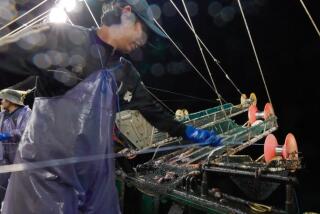Europe battles internal strife to save fishing stocks
ADRA, SPAIN — The catch of the day brings up a squirming pandemonium of creatures from the deep: sea bream and red snapper, miniature lobsters, an electric ray packing 150 volts, a baby octopus watching with one unblinking eye.
But skipper Mariano Lopez, gazing at this mound on his trawler’s deck, is disappointed. Like many patches of the Mediterranean, this overworked fishing ground is not yielding the bounty it once did.
“There should be twice as much,” Lopez says, shaking his head.
Fishermen were long seen as Europe’s last true hunters, but the romance that comes with the struggle against nature has dwindled as fast as the once-bountiful fish. The European Union has desperately implemented fishing curbs and other measures to keep Mediterranean and Atlantic waters alive -- policies fishermen complain are destroying their traditions and livelihoods.
But Europe’s campaign to save fishing stocks could be a losing battle.
North Sea stocks of cod, the emblematic fish in the Atlantic, have dropped by 75% in 30 years, according to EU figures, and special EU campaigns to revive the species over the last three years have failed. Bluefin tuna, once the pride of the Mediterranean, has seen stocks drop by 80% over the same time.
The situation is no different in the rest of the world. The journal Science warned recently that already 29% of seafood species had collapsed -- meaning stocks were down 90% or more from peak levels -- and all commercial species would follow suit by 2048 if current trends continue.
European fisheries’ precipitous decline has created a bitter cycle of recrimination.
The fishermen are angry at the bureaucrats and environmentalists. EU bureaucrats point the finger at fishermen. Environmentalists criticize both fishermen and bureaucrats.
“Now they look at us like criminals.... They want to massacre us,” said 56-year-old fisherman Jean-Marie Wacogne, some 1,350 miles north of Adra in Boulogne, France’s biggest fishing port.
But at the Nausicaa national sea center just across from Boulogne’s port, marine biologist Philippe Vallette says fishermen like Wacogne -- a grizzled veteran with a crooked walk that attests to more than four decades at sea -- are simply not in tune with reality.
With swift moves, he turned the statistics into a graph on a blackboard, with the lines inevitably gravitating downward. “This is something the fishermen do not want to see,” Nausicaa’s general director said.
Vallette’s demonstration drew parallels between Europe’s cod stocks and what happened off Canada’s Newfoundland over the last two decades.
The Grand Banks off Newfoundland had been bountiful since fishermen first set sail there looking for the staple that has fed millions in Europe since the Middle Ages. In the 1980s, Canadian fishermen scoffed at scientific warnings that stocks were diminishing even though they could see for themselves that the fish were getting smaller -- a key indicator of overfishing.
“All of a sudden they had to say: ‘Oh no, there are none left,’ ” said Vallette.
The crisis for Mediterranean bluefin tuna is just as dire.
It used to be commonplace for fishermen to catch tuna weighing up to 1,100 pounds in the Mediterranean. But as prices for the fish rose around the world over the last 25 years, industrial high-seas vessels jumped into the fray to make money off the growing global appetite for sushi and sashimi. Demand for sushi-grade tuna from increasingly affluent China has put yet another severe stress on stocks.
Monster-size tuna are now extremely rare. Fishermen are sapping stocks further by catching very small tuna before they can reproduce and placing them in cages to be fattened until they are big enough to sell.
With large, top-grade bluefin tuna fetching up to $52,000 at Tokyo wholesale markets, Mediterranean vessels still seek the ever scarcer big fish, eliminating the specimens that lay the most eggs.
“So now the problem is that a kind of pincer effect is created,” said Ricardo Aguilar, head of research for the European office of the environmental group Oceana. “On one hand, you remove the reproducers, and on the other you capture the young fish before they can reproduce. The worst thing is to have both extremes.”
Because of this, he said, the species might be commercially extinct worldwide in 10 to 15 years.
In its heyday, Adra was one of southern Spain’s most important fishing ports. Just 20 years ago, it boasted 15 large trawlers and at least 50 smaller boats. Now, there are about 15 in all. Small vessels once fished anchovies in waters off Morocco. Stocks were fabulously rich.
“For us, the anchovy was blue gold,” said Jose Nadal, 45, a former fisherman turned auctioneer at Adra’s fish market.
Those days are long gone.
“This is a hard life with no future, because there are less and less fish,” says Eduardo Ferres, a crew member on Lopez’s 80-foot boat. His windburned face is etched with the fatigue of 13-hour workdays that begin at 5 a.m. “I am 47. I look 57,” he said.
Fishermen across Europe are going out of business. Over the last decade, employment has shrunk at a rate of 6% per year. In a seafaring nation like Portugal, employment in the fisheries sector fell from 38,700 in 1990 to 21,345 in 2004. In Britain it went from 21,582 to 11,720; in France, from 26,851 to 18,415.
Across Europe, the scarcity of local fish has led consumers to scramble for seafood from remote corners of the world. At the Viszooi fish restaurant in The Hague, the Netherlands, late-night diners get their bluefin tuna sashimi from Sri Lanka instead of the Mediterranean. Even Britain’s lowly fish ‘n’ chips shops have replaced local cod and haddock with frozen catches from as far as New Zealand.
The EU has recognized the need for urgent action but has been hampered by the need to satisfy competing national interests. In the dead of night on Dec. 21, bleary-eyed ministers finished three days of negotiating the annual fishing cuts in the European Union in what has become a pre-Christmas rite.
Scientists had advised a full ban on catching cod in the North Sea, but the EU nations settled on a 14% cut -- enraging environmentalists.
“Political horse-trading on quotas continues, while our oceans are facing a crisis,” said Carol Phua, an expert from the World Wildlife Fund. “They are shooting themselves in the foot.”
European Union Fisheries Commissioner Joe Borg defends the EU’s common fishing policy, saying it has at least slowed the pace of decline.
“If every member state would be left to its own, the risk would be to have a race for the strongest fleet to catch as many as one can in the short term.”
All too often, fishermen also land fish illegally in port. Phua estimated that more than 40% of bluefin tuna catches in the Mediterranean are illegally landed to escape quota constraints.
Early one recent morning in Boulogne, Henri Hellin threw up his arms in exasperation at the sight of the overnight shipment at the dockside processing plant that he manages.
He had found that 15% of the red fish was undersize, too young. He was fuming: It should never have been caught, never have slipped through port controls and never arrived at his door.
“There are still far too many excesses. This makes me so angry,” he said.
Meanwhile, even top chefs accustomed to snapping up choice ingredients no matter how rare or costly are adapting menus in anticipation of the day when their favorite deep-sea delicacies will be unavailable.
On top of some smoked herring, Tony Lestienne delicately poured a pumpkin puree into a shot glass and finished it off with a herring foam. The Michelin-starred chef at Boulogne’s La Matelote restaurant had produced a small dish to his liking -- without endangered caviar.
For an upcoming banquet, cod was off the main course and more abundant saithe was on. His last meeting of the local chef association he heads centered on finding new fish recipes.
“When there will be nothing left, we will have to come up with solutions,” Lestienne said. “We have to respect fish more.... It iWe have to educate people how to love farmed fish.”
Raf Casert reported from Boulogne, France.
More to Read
Sign up for Essential California
The most important California stories and recommendations in your inbox every morning.
You may occasionally receive promotional content from the Los Angeles Times.










